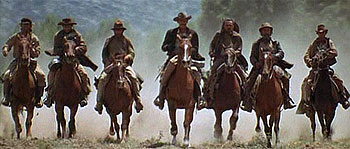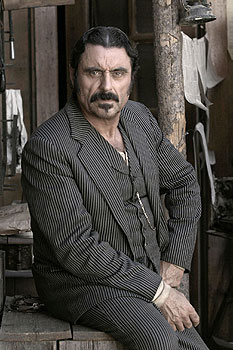“Welcome To Fucking Deadwood.”
Published on July 30th, 2011 in: Issues, My Dream Is On The Screen, TV |
The Wild Bunch, 1969
Sergio Leone’s Dollars trilogy, as well as his epic Once Upon a Time in the West, are also an obvious influence on Deadwood, as they are on most Westerns made after the 1960s. Leone redrew the lines of what could happen in a Western. Good and Evil became less distinct. A more critical eye was fixed on America’s cowboy heroes, and on America as a purveyor of cowboy justice. Yet Leone’s sense of humor, and his relatively tame level of violence are not found in Deadwood. There was one filmmaker who showed the brutality, savagery, and unchecked corruption which defined this period in American history better than anyone.
When you watch Sam Peckinpah’s 1969 masterwork, The Wild Bunch, his unfortunately-maligned Pat Garrett & Billy the Kid, as well as the low budget Bring Me the Head of Alfredo Garcia, you see a pure vision of the Modern Western, a vision which David Milch and the writers of Deadwood understand and present to us with absolute clarity. The Wild West is in its death throes, shuddering into the modern world, as seen at the end of a Gatling gun. There are no heroes; friends are forced to turn on one another. The cruelty in the heart of humanity is personified in the first shots of The Wild Bunch, as a group of children gather around, smiling, to watch two scorpions be devoured by a hill of ants.
From the beginning of Deadwood it is this casually sadistic side of humanity in which we are mired. The Metz Family are murdered by a group of men under the employ of Al Swearengen. Inciting the already fervent bigotry, Swearengen’s men plant evidence to suggest that it was an act of retaliation from the local Native American population against the camp. An angry mob of Deadwood’s lowest denizens leads to the eventual return of the severed head of one unfortunate victim. That we come to love Swearengen and follow his machinations as if they were our own is thanks to Ian McShane, who portrays the character with a flair and volatility to rival Daniel Day-Lewis’s Daniel Plainview in There Will Be Blood.

Ian McShane as Al Swearengen
Seth Bullock, played with appropriate rigidity by Timothy Olyphant, serves as our eyes in the early part of the series. He’s a gallant man trekking across the country with the hope of making a better life for the wife and son of his deceased brother, who he’s now taken as his own. With him is his friend and partner Sol Star, whose Jewish heritage leads to many issues with the camp. Through these two we see how quickly a harmless comment can turn into a knife between the ribs.
The interplay between Bullock and Swearengen sets the tone for Deadwood, eventually leading to a fist fight in the first episode of the second season, “A Lie Agreed Upon,” which sends the two careening off the balcony of the Gem Saloon. This fight and Swearengen’s subsequent illness transform the foul mouthed, cruel pimp into a more sympathetic character, and show him and Bullock to be closer in their sense of justice than is first assumed. The character of Cy Tolliver, and the introduction of George Hearst as a power in Deadwood in “Boy-the-Earth-Talks-To” are crucial in turning Swearengen from a villain to anti-hero. In comparison, he looks decent.
George Hearst, played by Gerald McRaney, is a character who craves power for its own sake. Written and performed with an exacting sense of villainy and humanity, Hearst can be considered alongside railroad tycoon Morton (Gabriele Ferzetti) from Leone’s Once Upon a Time in the West, as a frightening and pathetic insight into the human condition. Both Sergio Leone and Sam Peckinpah were astute in their depiction of the machinations of the powerful and the suffering of those without.
Time limit is exhausted. Please reload the CAPTCHA.